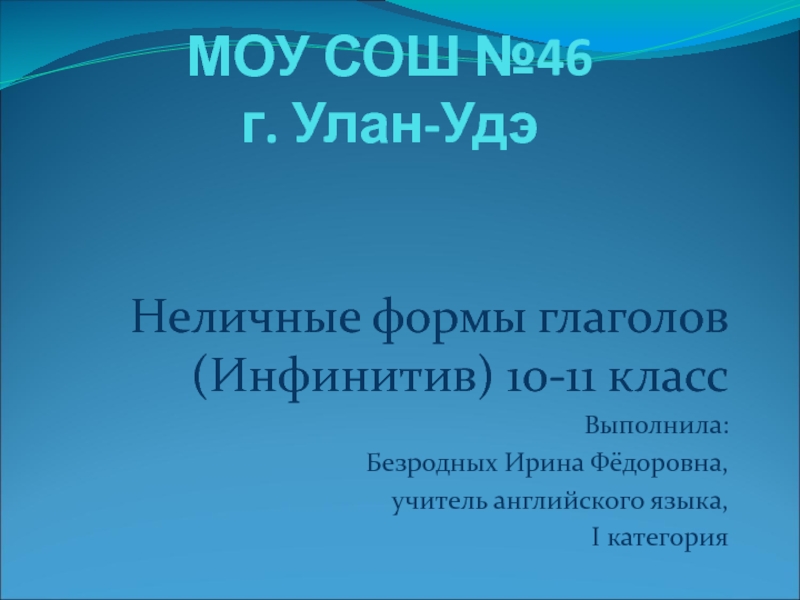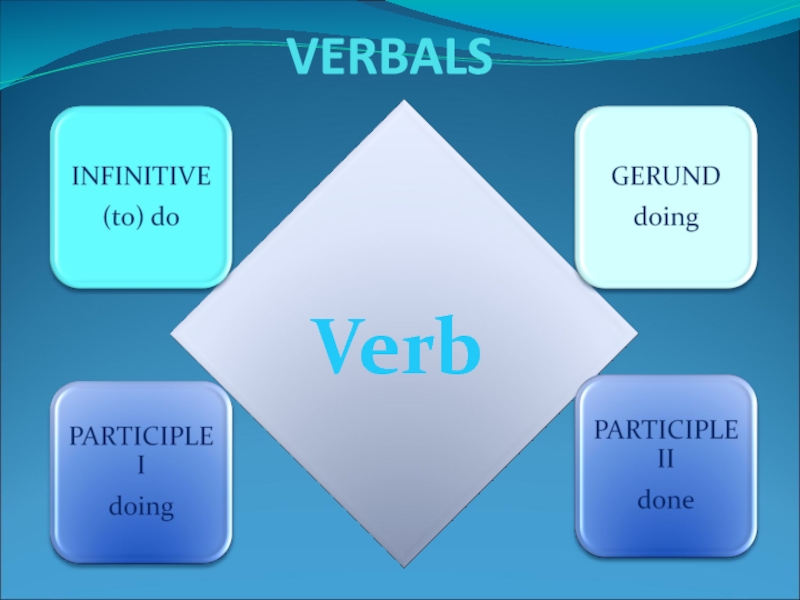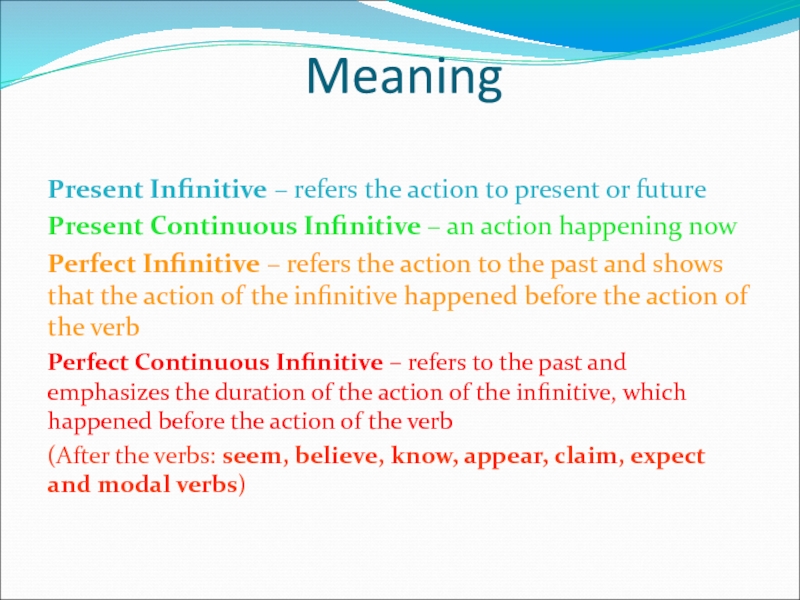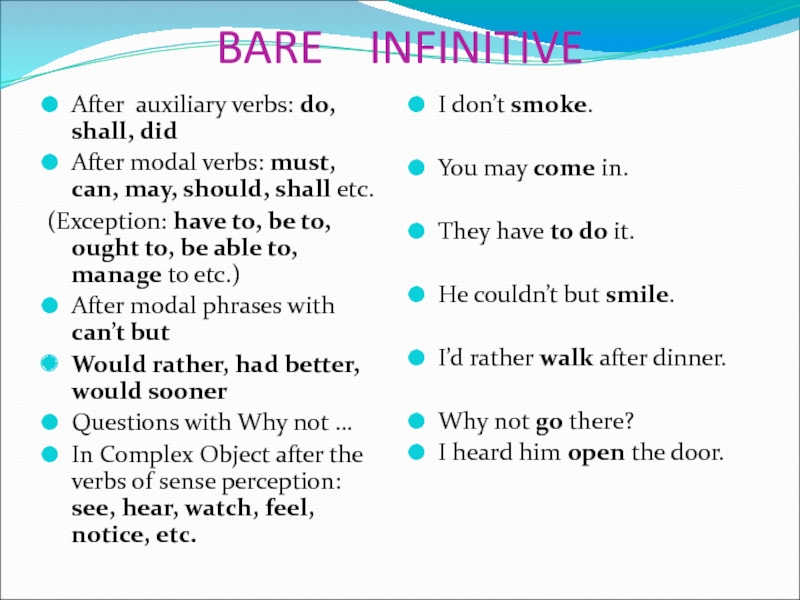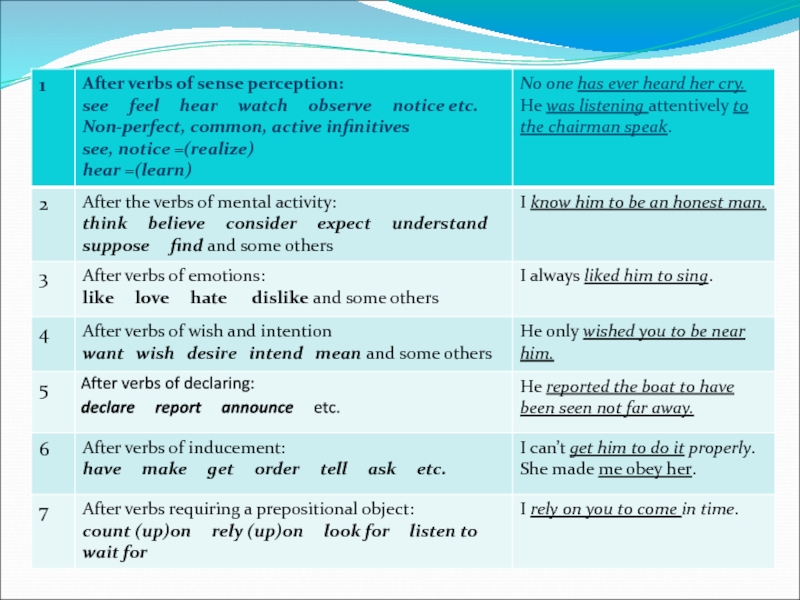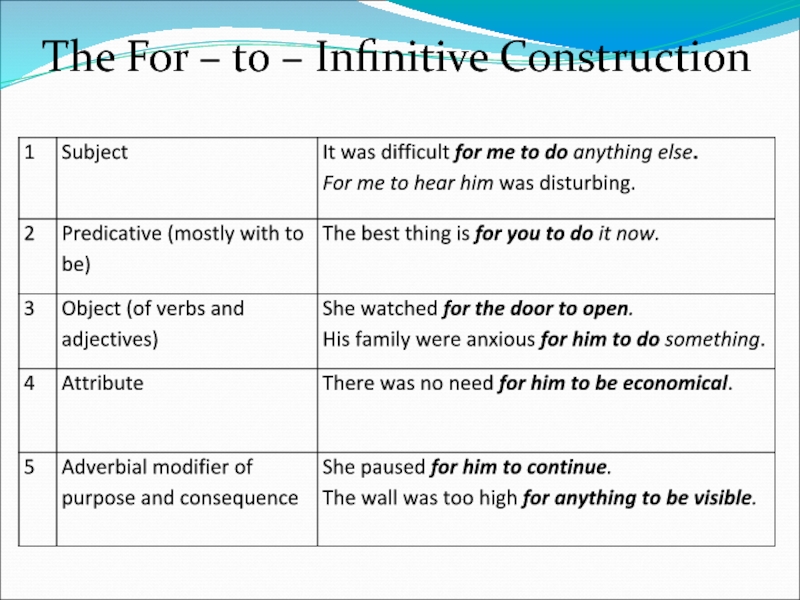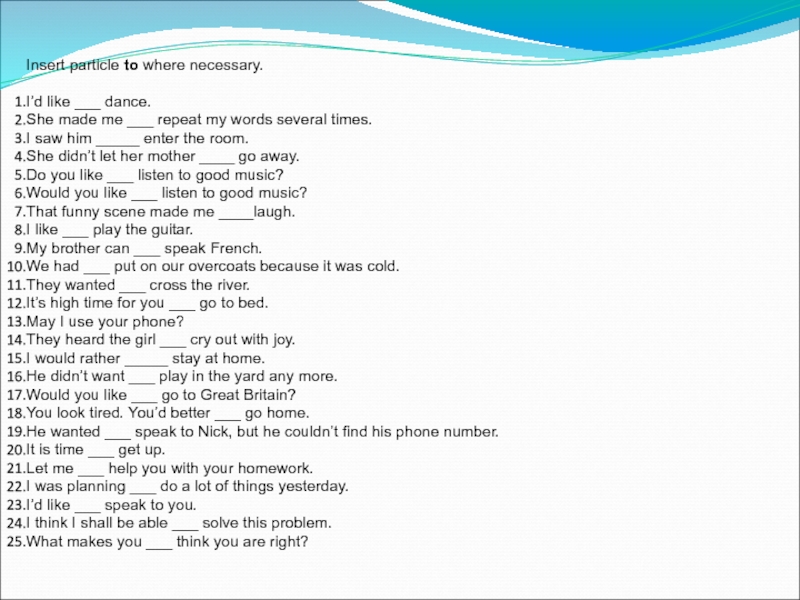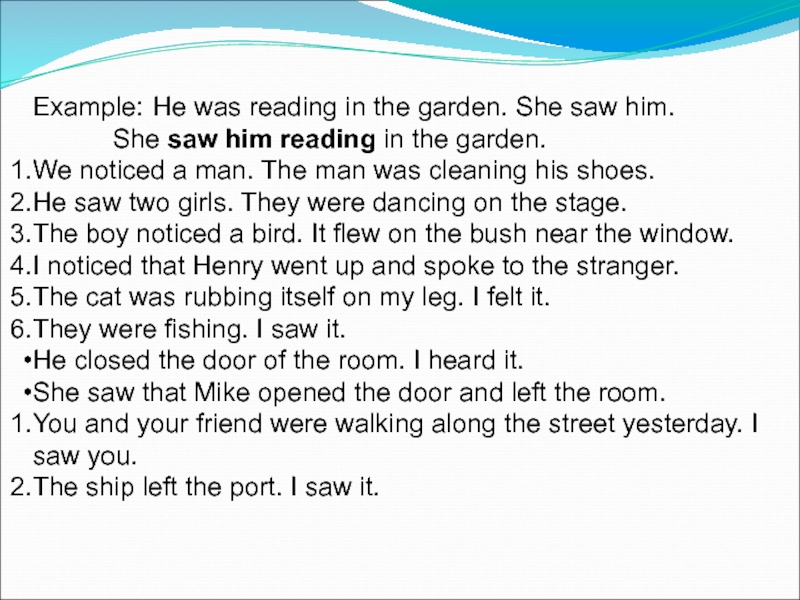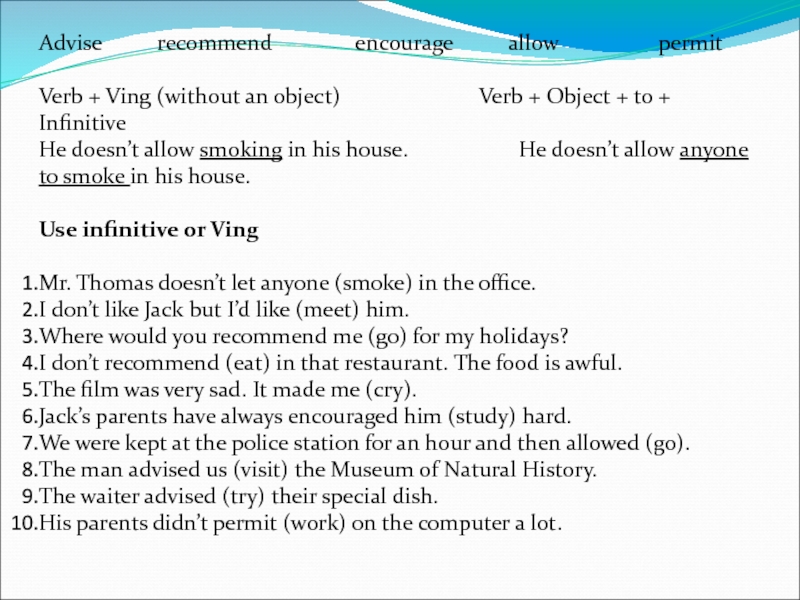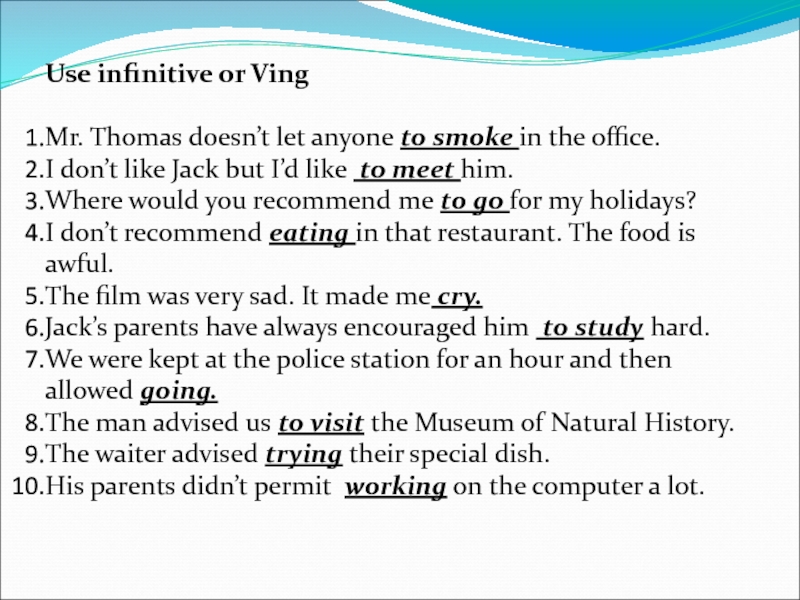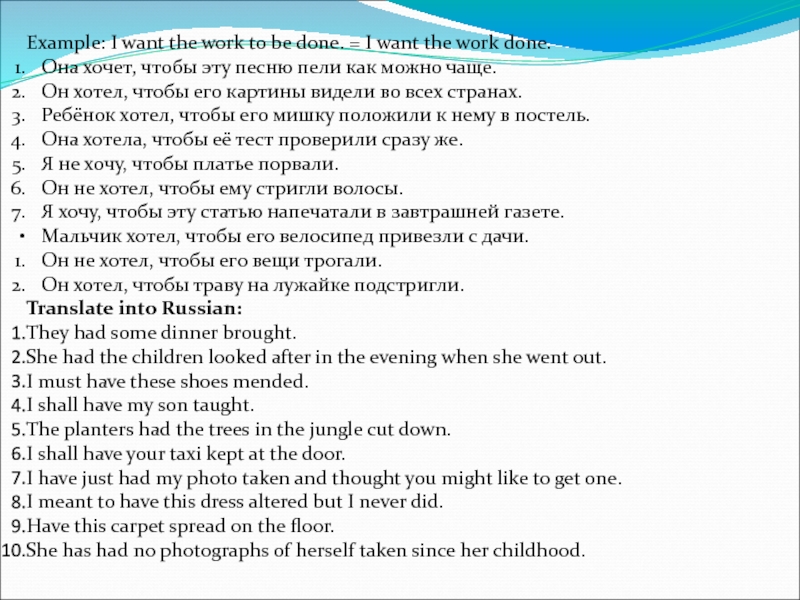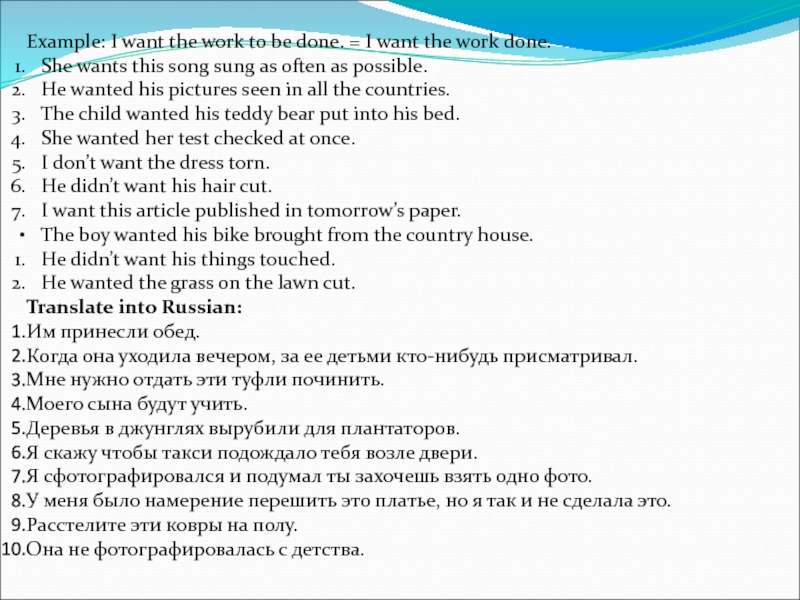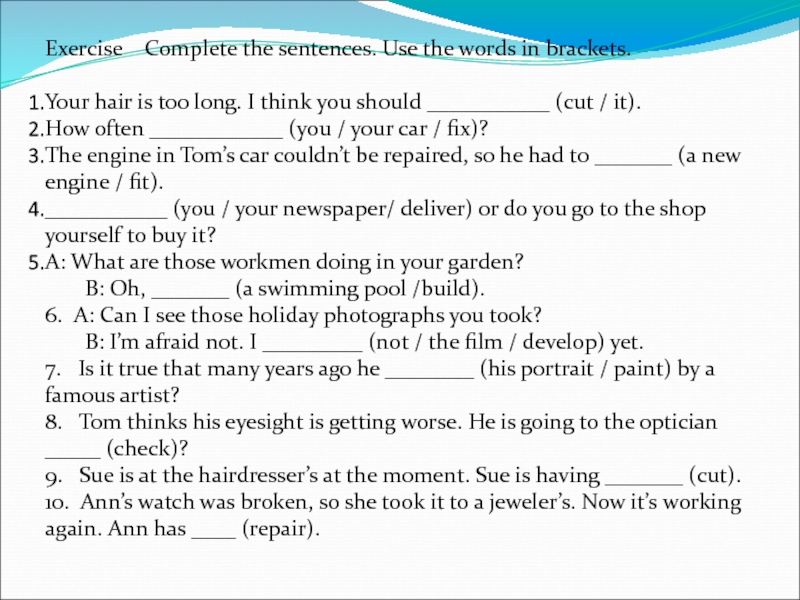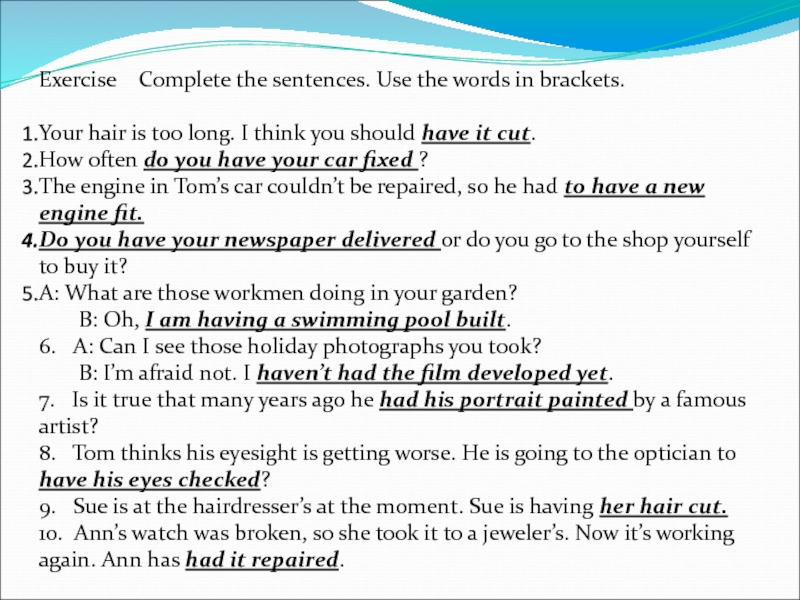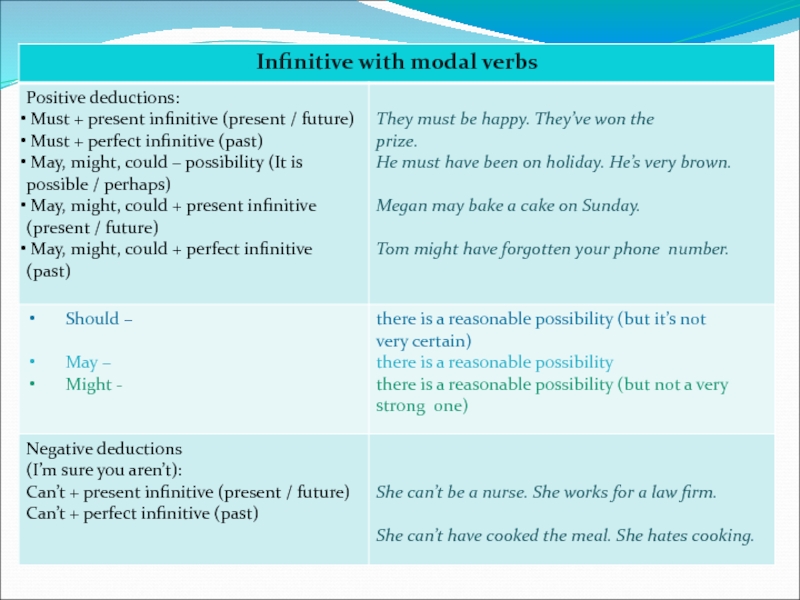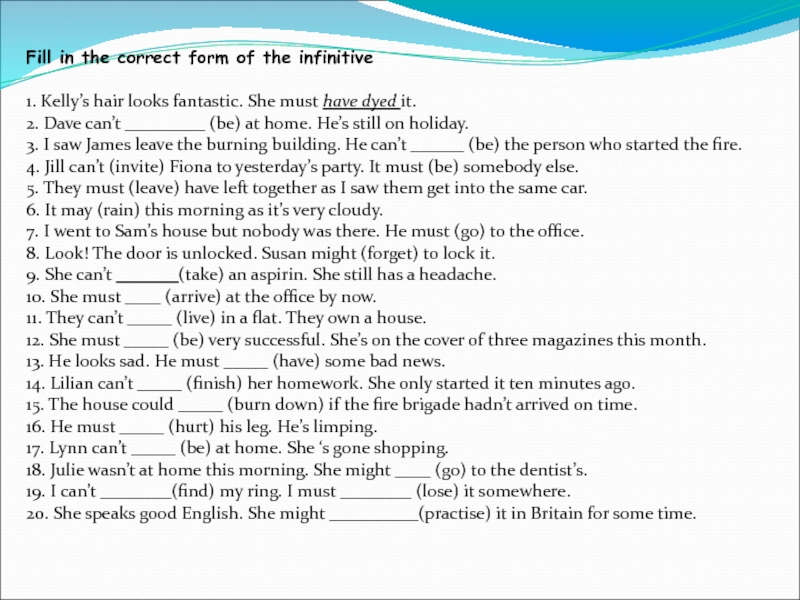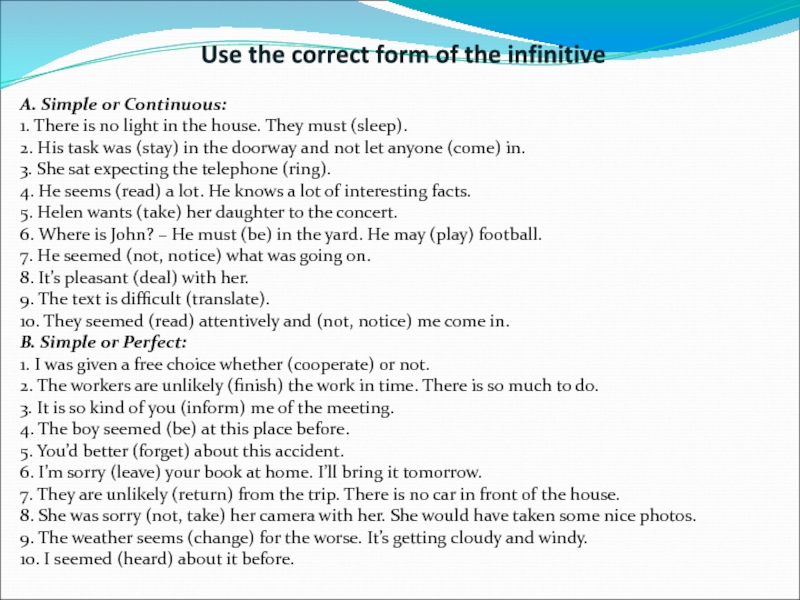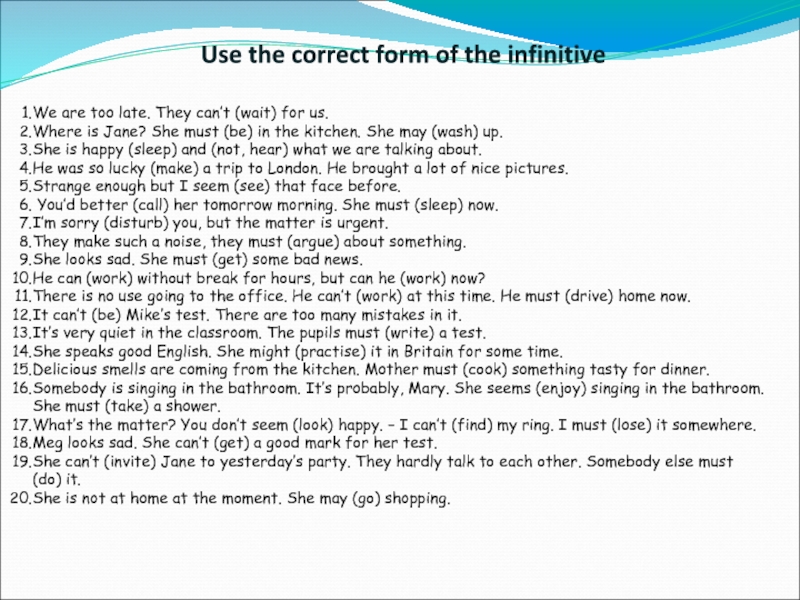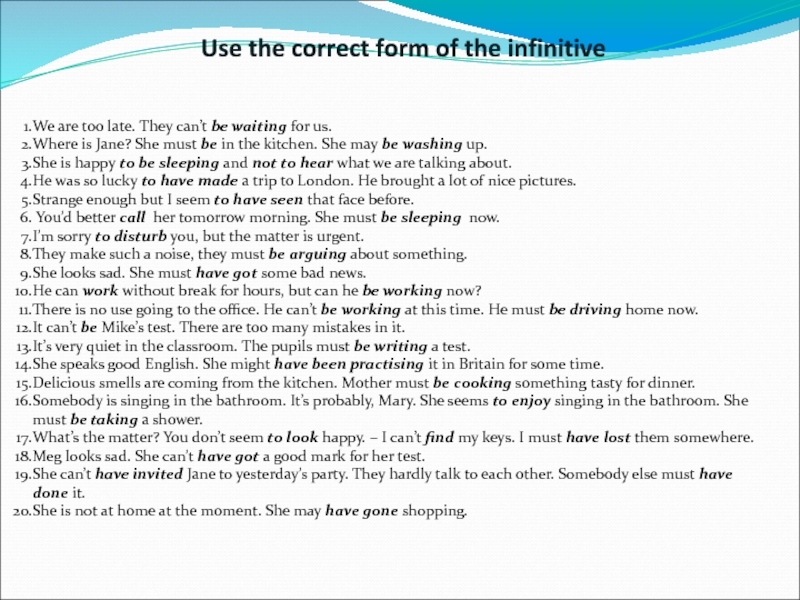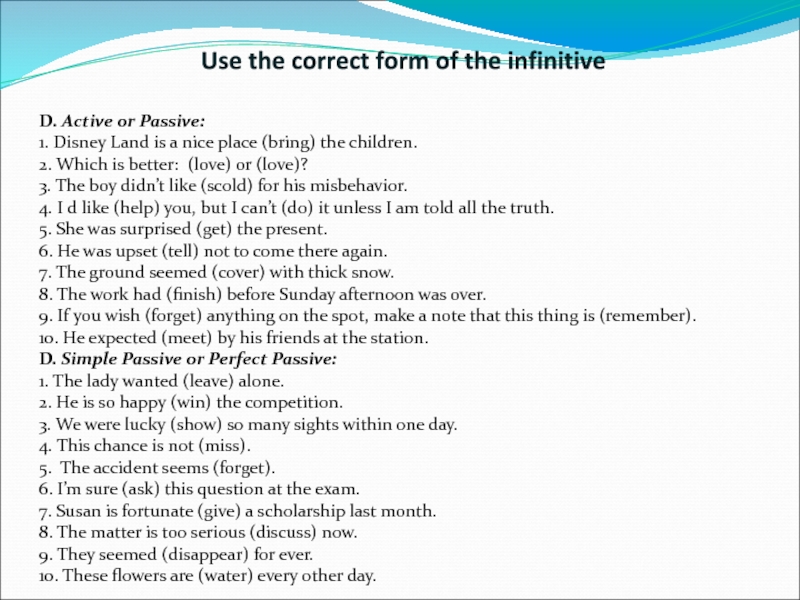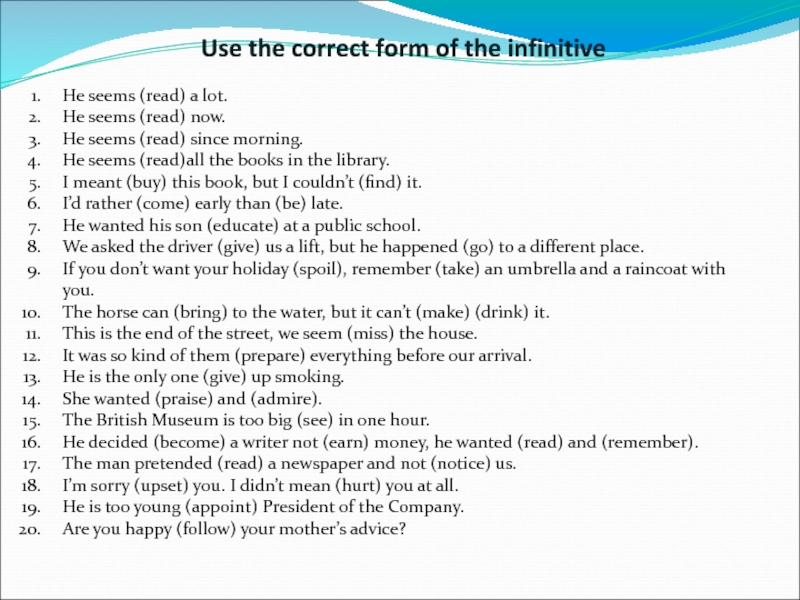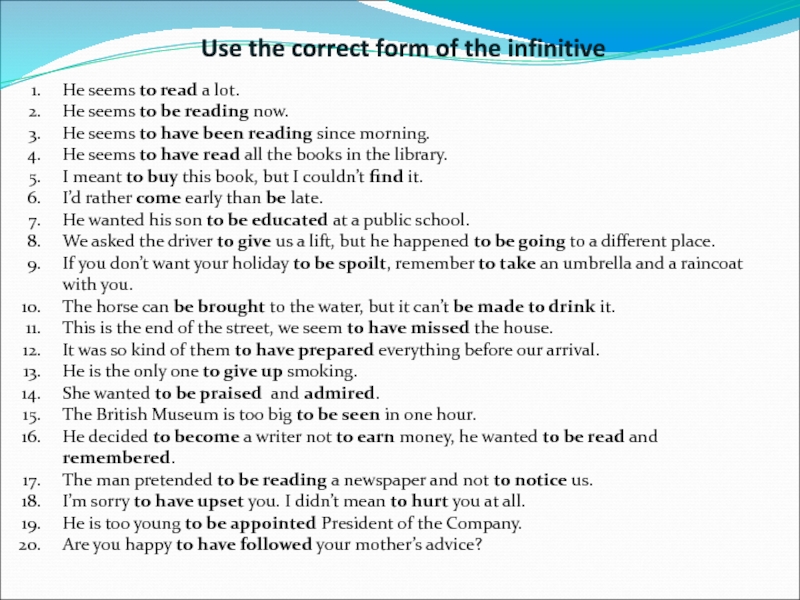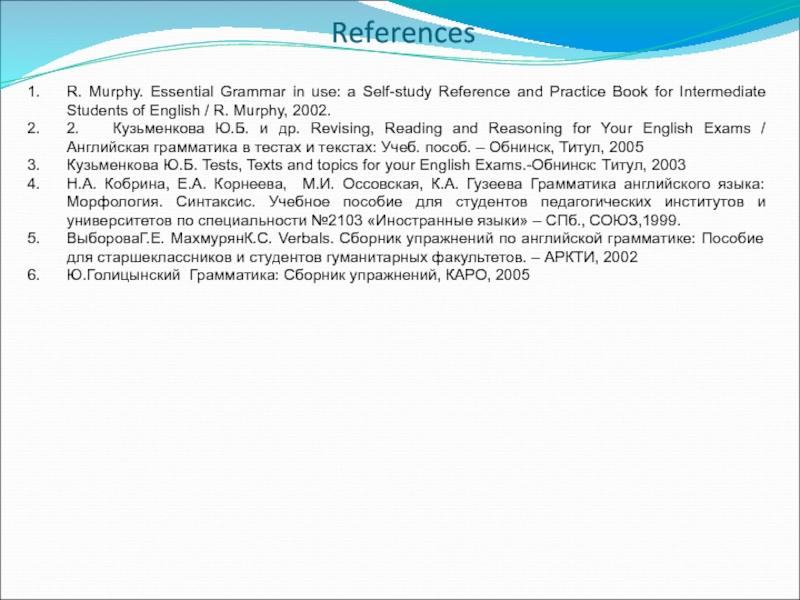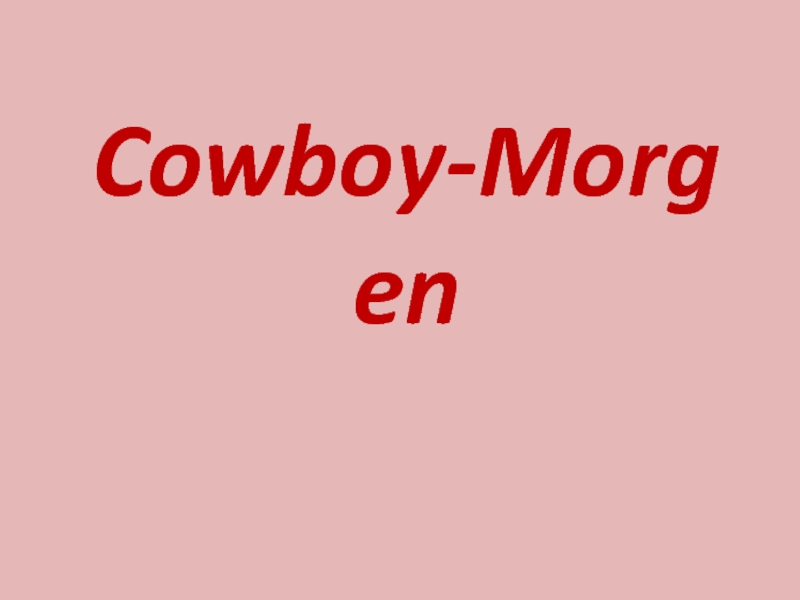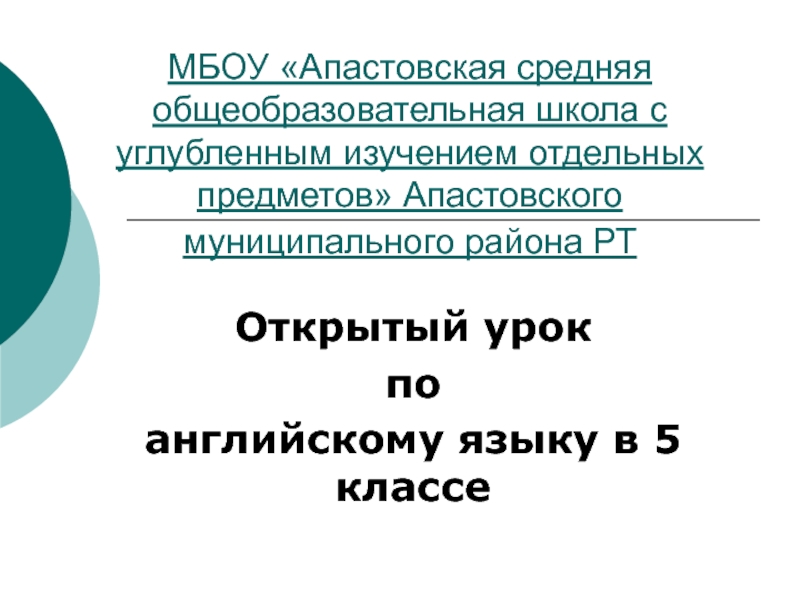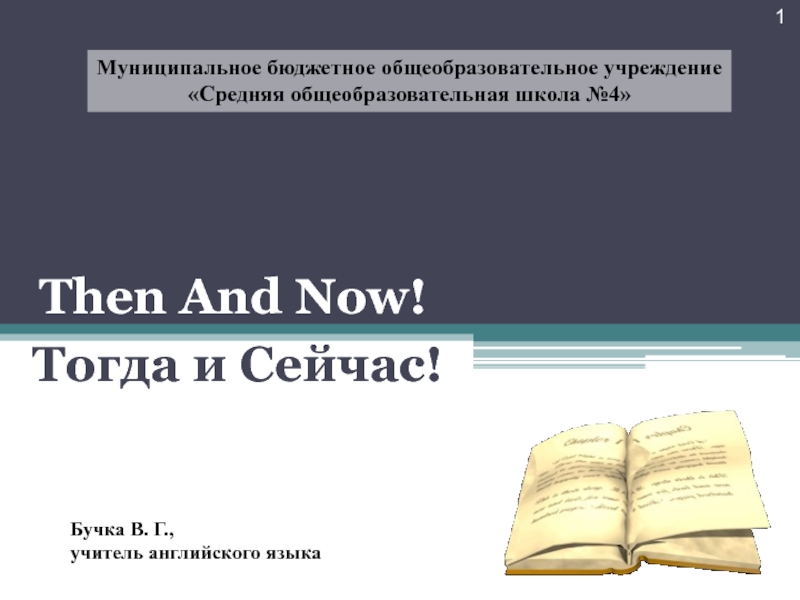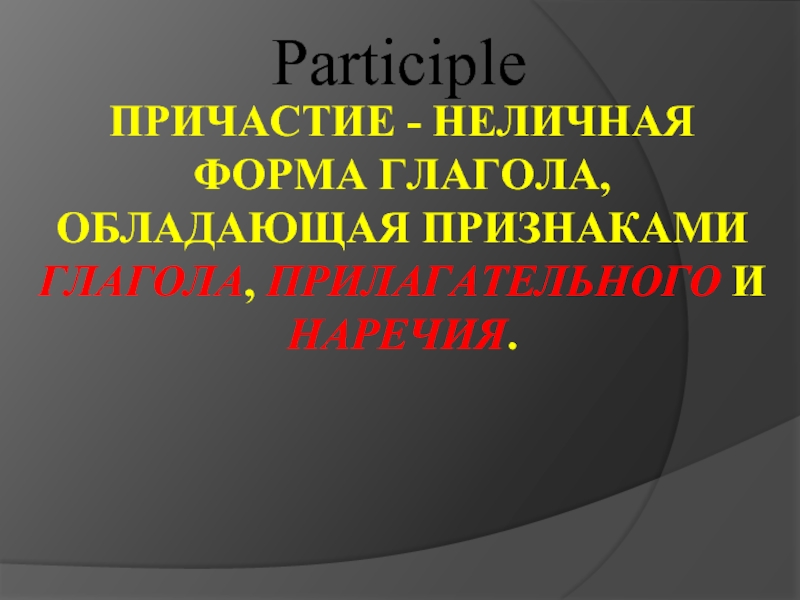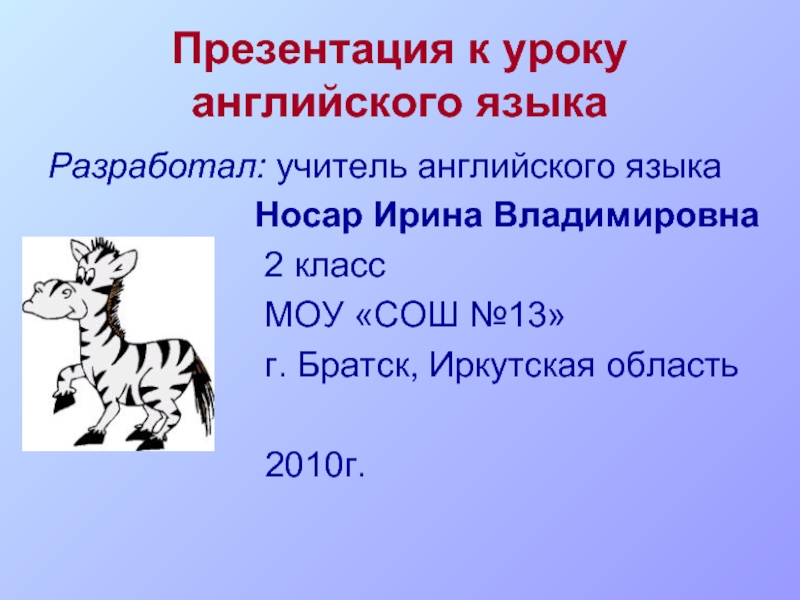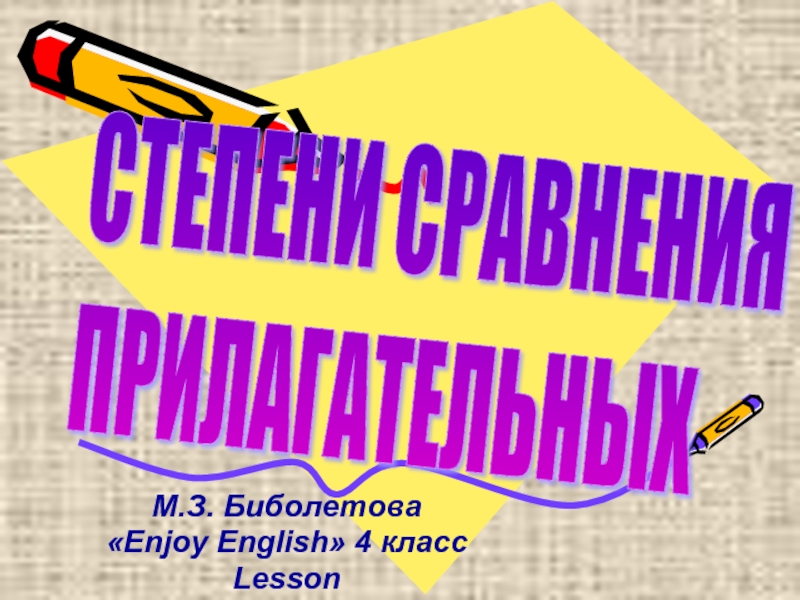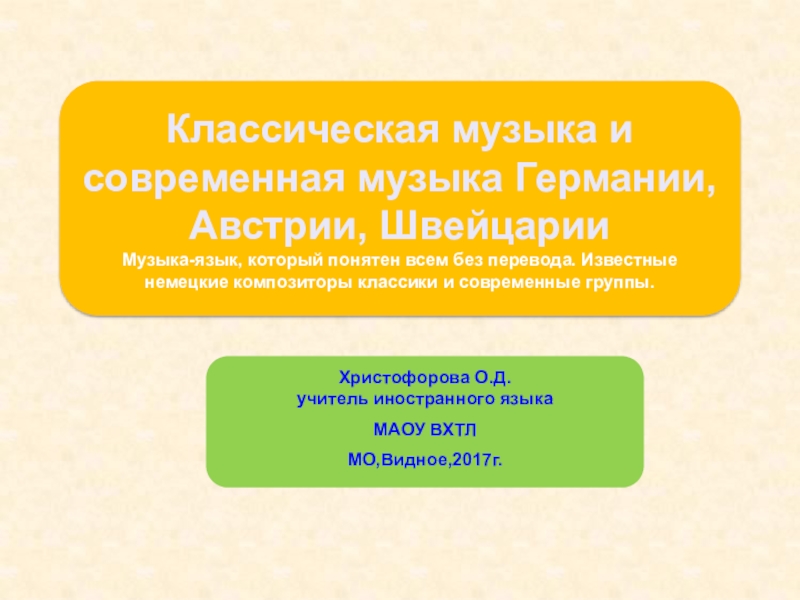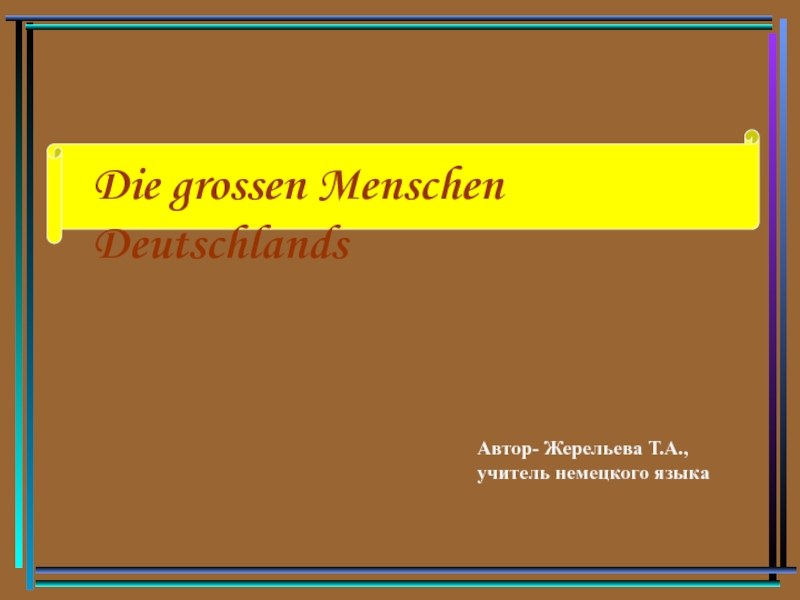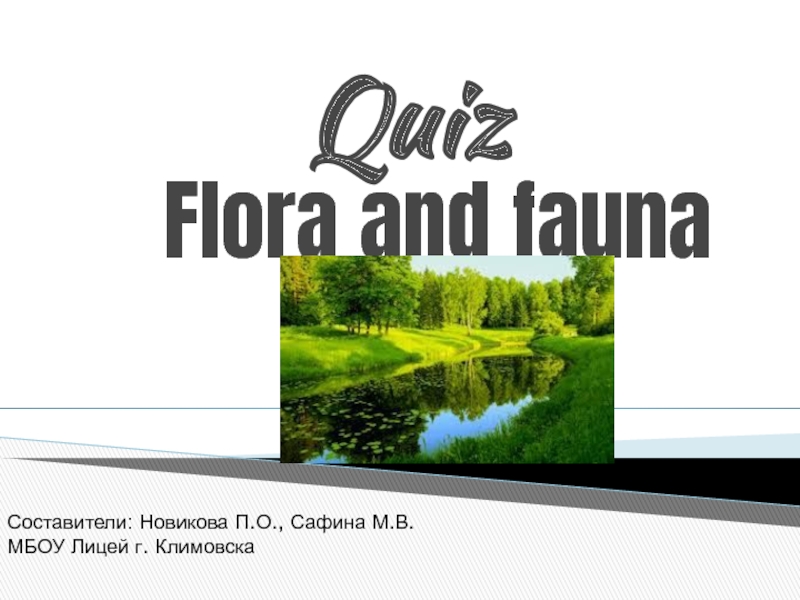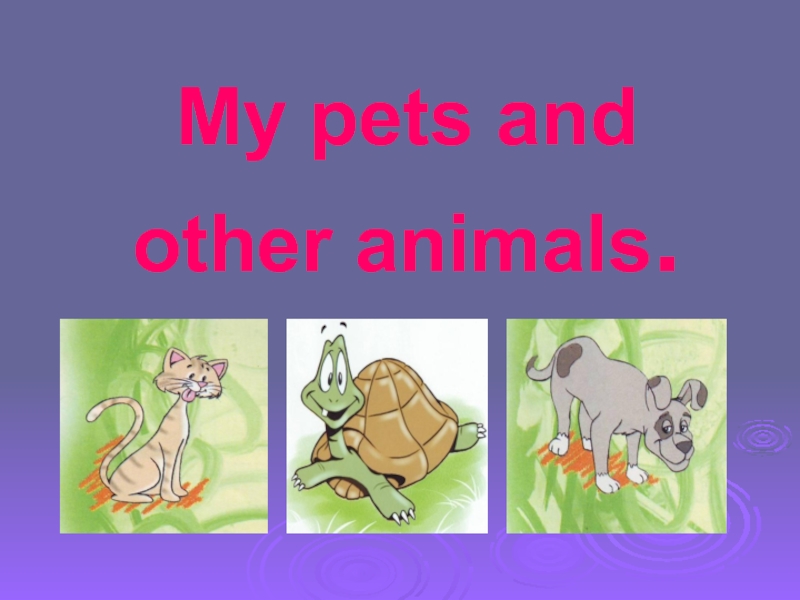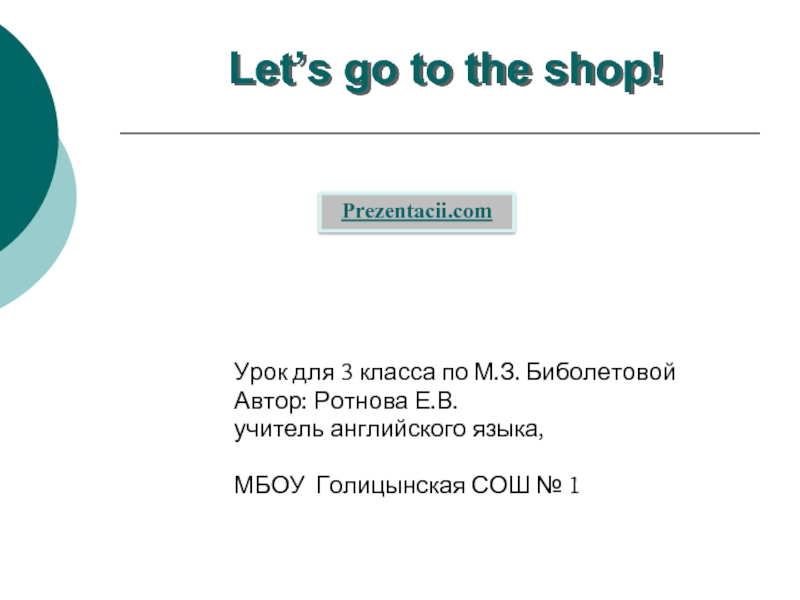Разделы презентаций
- Разное
- Английский язык
- Астрономия
- Алгебра
- Биология
- География
- Геометрия
- Детские презентации
- Информатика
- История
- Литература
- Математика
- Медицина
- Менеджмент
- Музыка
- МХК
- Немецкий язык
- ОБЖ
- Обществознание
- Окружающий мир
- Педагогика
- Русский язык
- Технология
- Физика
- Философия
- Химия
- Шаблоны, картинки для презентаций
- Экология
- Экономика
- Юриспруденция
Неличные формы глаголов (Инфинитив) 10 класс
Содержание
- 1. Неличные формы глаголов (Инфинитив) 10 класс
- 2. VERBALSVerb
- 3. Infinitive
- 4. Meaning Present Infinitive – refers the action
- 5. BARE INFINITIVEAfter auxiliary verbs: do, shall,
- 6. COMPLEX OBJECT
- 7. Слайд 7
- 8. The For – to – Infinitive Construction
- 9. The Complex SubjectThe construction has no analogy
- 10. Insert particle to where necessary.I’d like ___
- 11. Insert particle to where necessary.I’d like _to__
- 12. Example: “Don’t touch
- 13. Example: “Don’t touch
- 14. Example: He was reading in the garden. She
- 15. Example: He was reading in the garden. She
- 16. Advise recommend
- 17. Use infinitive or VingMr. Thomas doesn’t let
- 18. Example: I want the work to be
- 19. Example: I want the work to be
- 20. Exercise Complete the sentences. Use the
- 21. Exercise Complete the sentences. Use the
- 22. Слайд 22
- 23. Fill in the correct form of the
- 24. Use the correct form of the infinitiveA.
- 25. Use the correct form of the infinitiveA.
- 26. Use the correct form of the infinitiveWe
- 27. Use the correct form of the infinitiveWe
- 28. Use the correct form of the infinitiveD.
- 29. Use the correct form of the infinitiveD.
- 30. Use the correct form of the infinitiveHe
- 31. Use the correct form of the infinitiveHe
- 32. ReferencesR. Murphy. Essential Grammar in use: a
- 33. Скачать презентанцию
VERBALSVerb
Слайды и текст этой презентации
Слайд 4Meaning
Present Infinitive – refers the action to present or
future
Present Continuous Infinitive – an action happening now
Perfect Infinitive –
refers the action to the past and shows that the action of the infinitive happened before the action of the verbPerfect Continuous Infinitive – refers to the past and emphasizes the duration of the action of the infinitive, which happened before the action of the verb
(After the verbs: seem, believe, know, appear, claim, expect and modal verbs)
Слайд 5BARE INFINITIVE
After auxiliary verbs: do, shall, did
After modal verbs:
must, can, may, should, shall etc.
(Exception: have to, be
to, ought to, be able to, manage to etc.)After modal phrases with can’t but
Would rather, had better, would sooner
Questions with Why not …
In Complex Object after the verbs of sense perception: see, hear, watch, feel, notice, etc.
I don’t smoke.
You may come in.
They have to do it.
He couldn’t but smile.
I’d rather walk after dinner.
Why not go there?
I heard him open the door.
Слайд 9The Complex Subject
The construction has no analogy in Russian.
The
three subtypes of this predicate can be distinguished according to
the expression of the first part:Слайд 10Insert particle to where necessary.
I’d like ___ dance.
She made me
___ repeat my words several times.
I saw him _____ enter
the room.She didn’t let her mother ____ go away.
Do you like ___ listen to good music?
Would you like ___ listen to good music?
That funny scene made me ____laugh.
I like ___ play the guitar.
My brother can ___ speak French.
We had ___ put on our overcoats because it was cold.
They wanted ___ cross the river.
It’s high time for you ___ go to bed.
May I use your phone?
They heard the girl ___ cry out with joy.
I would rather _____ stay at home.
He didn’t want ___ play in the yard any more.
Would you like ___ go to Great Britain?
You look tired. You’d better ___ go home.
He wanted ___ speak to Nick, but he couldn’t find his phone number.
It is time ___ get up.
Let me ___ help you with your homework.
I was planning ___ do a lot of things yesterday.
I’d like ___ speak to you.
I think I shall be able ___ solve this problem.
What makes you ___ think you are right?
Слайд 11Insert particle to where necessary.
I’d like _to__ dance.
She made me
___ repeat my words several times.
I saw him _____ enter
the room.She didn’t let her mother ____ go away.
Do you like _to__ listen to good music?
Would you like _to__ listen to good music?
That funny scene made me ____laugh.
I like _to__ play the guitar.
My brother can ___ speak French.
We had _to__ put on our overcoats because it was cold.
They wanted _to__ cross the river.
It’s high time for you _to__ go to bed.
May I _____use your phone?
They heard the girl ___ cry out with joy.
I would rather _____ stay at home.
He didn’t want _to__ play in the yard any more.
Would you like _to__ go to Great Britain?
You look tired. You’d better ___ go home.
He wanted _to__ speak to Nick, but he couldn’t find his phone number.
It is time _to__ get up.
Let me ___ help you with your homework.
I was planning _to__ do a lot of things yesterday.
I’d like _to__ speak to you.
I think I shall be able _to__ solve this problem.
What makes you ___ think you are right?
Слайд 12Example: “Don’t touch anything,” the man
said to me.
The man told me not to touch anything.
“Don’t
forget to post the letter”, Jack said to me. (remind)She told me that it would be best if I told the police about the accident.(advise)
I told that you shouldn’t tell him anything. (warn)
I was surprised that it rained. (not, expect)
“Would you like to have dinner with me?” (invite)
At first I didn’t want to play tennis but John persuaded me. (persuade)
The sudden noise caused me to jump. (make)
If you’ve got a car, you are able to travel around more easily. (Having a car enables …)
She wouldn’t allow me to read the letter. (let)
The officer told the soldiers that they should clean their guns. (order)
I hate it when you forget about your duties.
The teacher doesn’t like it when we are not ready for a lesson.
The grandmother likes it when Lena plays the piano.
My father likes it when I speak English.
Parents love it when children laugh.
My sister doesn’t like when I argue with her.
She hates it when I’m late.
She hates it when children break their toys.
I like it when my brother reads books.
My parents don’t like it when I spend a lot of time on the computer.
Слайд 13Example: “Don’t touch anything,” the man
said to me.
The man told me not to touch anything.
Jack reminded me not to forget to post the letter.She advised me to tell the police about the accident.
I warned you not to tell him anything.
I didn’t expect it to rain.
He invited me to have dinner with him.
John persuaded me to play tennis.
The sudden noise made me jump.
Having a car enables you to travel around more easily.
She wouldn’t let me read the letter.
The officer ordered the soldiers to clean their guns.
I hate you to forget about your duties.
The teacher doesn’t like us not to be not ready for a lesson.
The grandmother likes Lena to play the piano.
My father likes me to speak English.
Parents love their children to laugh.
My sister doesn’t like me to argue with her.
She hates me to be late.
She hates the children to break their toys.
I like my brother to read books.
My parents don’t like me to spend a lot of time on the computer.
Слайд 14Example: He was reading in the garden. She saw him.
She saw
him reading in the garden.
We noticed a man. The man
was cleaning his shoes.He saw two girls. They were dancing on the stage.
The boy noticed a bird. It flew on the bush near the window.
I noticed that Henry went up and spoke to the stranger.
The cat was rubbing itself on my leg. I felt it.
They were fishing. I saw it.
He closed the door of the room. I heard it.
She saw that Mike opened the door and left the room.
You and your friend were walking along the street yesterday. I saw you.
The ship left the port. I saw it.
Слайд 15Example: He was reading in the garden. She saw him.
She saw
him reading in the garden.
We noticed a man cleaning his
shoes.He saw two girls dancing on the stage.
The boy noticed a bird fly on the bush near the window.
I noticed Henry go up and speak to the stranger.
I felt the cat rubbing itself on my leg.
I saw them fishing.
I heard him close the door.
She saw Mike open the door and leave the room.
I saw you and your friend walking along the street yesterday.
I saw it the ship leave the port.
Слайд 16Advise recommend
encourage allow
permitVerb + Ving (without an object) Verb + Object + to + Infinitive
He doesn’t allow smoking in his house. He doesn’t allow anyone to smoke in his house.
Use infinitive or Ving
Mr. Thomas doesn’t let anyone (smoke) in the office.
I don’t like Jack but I’d like (meet) him.
Where would you recommend me (go) for my holidays?
I don’t recommend (eat) in that restaurant. The food is awful.
The film was very sad. It made me (cry).
Jack’s parents have always encouraged him (study) hard.
We were kept at the police station for an hour and then allowed (go).
The man advised us (visit) the Museum of Natural History.
The waiter advised (try) their special dish.
His parents didn’t permit (work) on the computer a lot.
Слайд 17Use infinitive or Ving
Mr. Thomas doesn’t let anyone to smoke
in the office.
I don’t like Jack but I’d like to
meet him.Where would you recommend me to go for my holidays?
I don’t recommend eating in that restaurant. The food is awful.
The film was very sad. It made me cry.
Jack’s parents have always encouraged him to study hard.
We were kept at the police station for an hour and then allowed going.
The man advised us to visit the Museum of Natural History.
The waiter advised trying their special dish.
His parents didn’t permit working on the computer a lot.
Слайд 18Example: I want the work to be done. = I
want the work done.
Она хочет, чтобы эту
песню пели как можно чаще.Он хотел, чтобы его картины видели во всех странах.
Ребёнок хотел, чтобы его мишку положили к нему в постель.
Она хотела, чтобы её тест проверили сразу же.
Я не хочу, чтобы платье порвали.
Он не хотел, чтобы ему стригли волосы.
Я хочу, чтобы эту статью напечатали в завтрашней газете.
Мальчик хотел, чтобы его велосипед привезли с дачи.
Он не хотел, чтобы его вещи трогали.
Он хотел, чтобы траву на лужайке подстригли.
Translate into Russian:
They had some dinner brought.
She had the children looked after in the evening when she went out.
I must have these shoes mended.
I shall have my son taught.
The planters had the trees in the jungle cut down.
I shall have your taxi kept at the door.
I have just had my photo taken and thought you might like to get one.
I meant to have this dress altered but I never did.
Have this carpet spread on the floor.
She has had no photographs of herself taken since her childhood.
Слайд 19Example: I want the work to be done. = I
want the work done.
She wants this song
sung as often as possible.He wanted his pictures seen in all the countries.
The child wanted his teddy bear put into his bed.
She wanted her test checked at once.
I don’t want the dress torn.
He didn’t want his hair cut.
I want this article published in tomorrow’s paper.
The boy wanted his bike brought from the country house.
He didn’t want his things touched.
He wanted the grass on the lawn cut.
Translate into Russian:
Им принесли обед.
Когда она уходила вечером, за ее детьми кто-нибудь присматривал.
Мне нужно отдать эти туфли починить.
Моего сына будут учить.
Деревья в джунглях вырубили для плантаторов.
Я скажу чтобы такси подождало тебя возле двери.
Я сфотографировался и подумал ты захочешь взять одно фото.
У меня было намерение перешить это платье, но я так и не сделала это.
Расстелите эти ковры на полу.
Она не фотографировалась с детства.
Слайд 20Exercise Complete the sentences. Use the words in brackets.
Your
hair is too long. I think you should ___________ (cut
/ it).How often ____________ (you / your car / fix)?
The engine in Tom’s car couldn’t be repaired, so he had to _______ (a new engine / fit).
___________ (you / your newspaper/ deliver) or do you go to the shop yourself to buy it?
A: What are those workmen doing in your garden?
B: Oh, _______ (a swimming pool /build).
6. A: Can I see those holiday photographs you took?
B: I’m afraid not. I _________ (not / the film / develop) yet.
7. Is it true that many years ago he ________ (his portrait / paint) by a famous artist?
8. Tom thinks his eyesight is getting worse. He is going to the optician _____ (check)?
9. Sue is at the hairdresser’s at the moment. Sue is having _______ (cut).
10. Ann’s watch was broken, so she took it to a jeweler’s. Now it’s working again. Ann has ____ (repair).
Слайд 21Exercise Complete the sentences. Use the words in brackets.
Your
hair is too long. I think you should have it
cut.How often do you have your car fixed ?
The engine in Tom’s car couldn’t be repaired, so he had to have a new engine fit.
Do you have your newspaper delivered or do you go to the shop yourself to buy it?
A: What are those workmen doing in your garden?
B: Oh, I am having a swimming pool built.
6. A: Can I see those holiday photographs you took?
B: I’m afraid not. I haven’t had the film developed yet.
7. Is it true that many years ago he had his portrait painted by a famous artist?
8. Tom thinks his eyesight is getting worse. He is going to the optician to have his eyes checked?
9. Sue is at the hairdresser’s at the moment. Sue is having her hair cut.
10. Ann’s watch was broken, so she took it to a jeweler’s. Now it’s working again. Ann has had it repaired.
Слайд 23Fill in the correct form of the infinitive
1. Kelly’s hair
looks fantastic. She must have dyed it.
2. Dave can’t _________
(be) at home. He’s still on holiday.3. I saw James leave the burning building. He can’t ______ (be) the person who started the fire.
4. Jill can’t (invite) Fiona to yesterday’s party. It must (be) somebody else.
5. They must (leave) have left together as I saw them get into the same car.
6. It may (rain) this morning as it’s very cloudy.
7. I went to Sam’s house but nobody was there. He must (go) to the office.
8. Look! The door is unlocked. Susan might (forget) to lock it.
9. She can’t (take) an aspirin. She still has a headache.
10. She must ____ (arrive) at the office by now.
11. They can’t _____ (live) in a flat. They own a house.
12. She must _____ (be) very successful. She’s on the cover of three magazines this month.
13. He looks sad. He must _____ (have) some bad news.
14. Lilian can’t _____ (finish) her homework. She only started it ten minutes ago.
15. The house could _____ (burn down) if the fire brigade hadn’t arrived on time.
16. He must _____ (hurt) his leg. He’s limping.
17. Lynn can’t _____ (be) at home. She ‘s gone shopping.
18. Julie wasn’t at home this morning. She might ____ (go) to the dentist’s.
19. I can’t ________(find) my ring. I must ________ (lose) it somewhere.
20. She speaks good English. She might __________(practise) it in Britain for some time.
Слайд 24Use the correct form of the infinitive
A. Simple or Continuous:
1.
There is no light in the house. They must (sleep).
2.
His task was (stay) in the doorway and not let anyone (come) in. 3. She sat expecting the telephone (ring).
4. He seems (read) a lot. He knows a lot of interesting facts.
5. Helen wants (take) her daughter to the concert.
6. Where is John? – He must (be) in the yard. He may (play) football.
7. He seemed (not, notice) what was going on.
8. It’s pleasant (deal) with her.
9. The text is difficult (translate).
10. They seemed (read) attentively and (not, notice) me come in.
B. Simple or Perfect:
1. I was given a free choice whether (cooperate) or not.
2. The workers are unlikely (finish) the work in time. There is so much to do.
3. It is so kind of you (inform) me of the meeting.
4. The boy seemed (be) at this place before.
5. You’d better (forget) about this accident.
6. I’m sorry (leave) your book at home. I’ll bring it tomorrow.
7. They are unlikely (return) from the trip. There is no car in front of the house.
8. She was sorry (not, take) her camera with her. She would have taken some nice photos.
9. The weather seems (change) for the worse. It’s getting cloudy and windy.
10. I seemed (heard) about it before.
Слайд 25Use the correct form of the infinitive
A. Simple or Continuous:
1.
There is no light in the house. They must be
sleeping.2. His task was to stay in the doorway and not let anyone come in.
3. She sat expecting the telephone to ring.
4. He seems to read a lot. He knows a lot of interesting facts.
5. Helen wants to take her daughter to the concert.
6. Where is John? – He must be in the yard. He may be playing football.
7. He didn’t seem to notice what was going on.
8. It’s pleasant to deal with her.
9. The text is difficult to translate.
10. They seemed be reading attentively and not to notice) me come in.
B. Simple or Perfect:
1. I was given a free choice whether to cooperate or not.
2. The workers are unlikely to finish the work in time. There is so much to do.
3. It is so kind of you to inform me of the meeting.
4. The boy seemed to have been at this place before.
5. You’d better forget about this accident.
6. I’m sorry to have left your book at home. I’ll bring it tomorrow.
7. They are unlikely to return from the trip so soon.
8. She was sorry not to have taken her camera with her. She would have taken some nice photos.
9. The weather seems to have changed for the worse. It’s getting cloudy and windy.
10. I seemed to have heard about it before.
Слайд 26Use the correct form of the infinitive
We are too late.
They can’t (wait) for us.
Where is Jane? She must (be)
in the kitchen. She may (wash) up.She is happy (sleep) and (not, hear) what we are talking about.
He was so lucky (make) a trip to London. He brought a lot of nice pictures.
Strange enough but I seem (see) that face before.
You’d better (call) her tomorrow morning. She must (sleep) now.
I’m sorry (disturb) you, but the matter is urgent.
They make such a noise, they must (argue) about something.
She looks sad. She must (get) some bad news.
He can (work) without break for hours, but can he (work) now?
There is no use going to the office. He can’t (work) at this time. He must (drive) home now.
It can’t (be) Mike’s test. There are too many mistakes in it.
It’s very quiet in the classroom. The pupils must (write) a test.
She speaks good English. She might (practise) it in Britain for some time.
Delicious smells are coming from the kitchen. Mother must (cook) something tasty for dinner.
Somebody is singing in the bathroom. It’s probably, Mary. She seems (enjoy) singing in the bathroom. She must (take) a shower.
What’s the matter? You don’t seem (look) happy. – I can’t (find) my ring. I must (lose) it somewhere.
Meg looks sad. She can’t (get) a good mark for her test.
She can’t (invite) Jane to yesterday’s party. They hardly talk to each other. Somebody else must (do) it.
She is not at home at the moment. She may (go) shopping.
Слайд 27Use the correct form of the infinitive
We are too late.
They can’t be waiting for us.
Where is Jane? She must
be in the kitchen. She may be washing up.She is happy to be sleeping and not to hear what we are talking about.
He was so lucky to have made a trip to London. He brought a lot of nice pictures.
Strange enough but I seem to have seen that face before.
You’d better call her tomorrow morning. She must be sleeping now.
I’m sorry to disturb you, but the matter is urgent.
They make such a noise, they must be arguing about something.
She looks sad. She must have got some bad news.
He can work without break for hours, but can he be working now?
There is no use going to the office. He can’t be working at this time. He must be driving home now.
It can’t be Mike’s test. There are too many mistakes in it.
It’s very quiet in the classroom. The pupils must be writing a test.
She speaks good English. She might have been practising it in Britain for some time.
Delicious smells are coming from the kitchen. Mother must be cooking something tasty for dinner.
Somebody is singing in the bathroom. It’s probably, Mary. She seems to enjoy singing in the bathroom. She must be taking a shower.
What’s the matter? You don’t seem to look happy. – I can’t find my keys. I must have lost them somewhere.
Meg looks sad. She can’t have got a good mark for her test.
She can’t have invited Jane to yesterday’s party. They hardly talk to each other. Somebody else must have done it.
She is not at home at the moment. She may have gone shopping.
Слайд 28Use the correct form of the infinitive
D. Active or Passive:
1.
Disney Land is a nice place (bring) the children.
2. Which
is better: (love) or (love)?3. The boy didn’t like (scold) for his misbehavior.
4. I d like (help) you, but I can’t (do) it unless I am told all the truth.
5. She was surprised (get) the present.
6. He was upset (tell) not to come there again.
7. The ground seemed (cover) with thick snow.
8. The work had (finish) before Sunday afternoon was over.
9. If you wish (forget) anything on the spot, make a note that this thing is (remember).
10. He expected (meet) by his friends at the station.
D. Simple Passive or Perfect Passive:
1. The lady wanted (leave) alone.
2. He is so happy (win) the competition.
3. We were lucky (show) so many sights within one day.
4. This chance is not (miss).
5. The accident seems (forget).
6. I’m sure (ask) this question at the exam.
7. Susan is fortunate (give) a scholarship last month.
8. The matter is too serious (discuss) now.
9. They seemed (disappear) for ever.
10. These flowers are (water) every other day.
Слайд 29Use the correct form of the infinitive
D. Active or Passive:
1.
Disney Land is a nice place to bring the children.
2.
Which is better: to love or to be loved?3. The boy didn’t like to be scolded for his misbehavior.
4. I d like to help you, but I can’t do it unless I am told all the truth.
5. She was surprised to get the present.
6. He was upset to be told not to come there again.
7. The ground seemed to be covered with thick snow.
8. The work had to be finished before Sunday afternoon was over.
9. If you wish to forget anything on the spot, make a note that this thing is to be remembered.
10. He expected to be met by his friends at the station.
D. Simple Passive or Perfect Passive:
1. The lady wanted to be left alone.
2. He is so happy to have won the competition.
3. We were lucky to have been shown so many sights within one day.
4. This chance is not to be missed.
5. The accident seems to have been forgotten.
6. I’m sure to be asked this question at the exam.
7. Susan is fortunate to have been given a scholarship last month.
8. The matter is too serious to be discussed now.
9. They seemed to have disappeared for ever.
10. These flowers are to be watered every other day.
Слайд 30Use the correct form of the infinitive
He seems (read) a
lot.
He seems (read) now.
He seems (read) since morning.
He
seems (read)all the books in the library. I meant (buy) this book, but I couldn’t (find) it.
I’d rather (come) early than (be) late.
He wanted his son (educate) at a public school.
We asked the driver (give) us a lift, but he happened (go) to a different place.
If you don’t want your holiday (spoil), remember (take) an umbrella and a raincoat with you.
The horse can (bring) to the water, but it can’t (make) (drink) it.
This is the end of the street, we seem (miss) the house.
It was so kind of them (prepare) everything before our arrival.
He is the only one (give) up smoking.
She wanted (praise) and (admire).
The British Museum is too big (see) in one hour.
He decided (become) a writer not (earn) money, he wanted (read) and (remember).
The man pretended (read) a newspaper and not (notice) us.
I’m sorry (upset) you. I didn’t mean (hurt) you at all.
He is too young (appoint) President of the Company.
Are you happy (follow) your mother’s advice?
Слайд 31Use the correct form of the infinitive
He seems to read
a lot.
He seems to be reading now.
He seems to
have been reading since morning. He seems to have read all the books in the library.
I meant to buy this book, but I couldn’t find it.
I’d rather come early than be late.
He wanted his son to be educated at a public school.
We asked the driver to give us a lift, but he happened to be going to a different place.
If you don’t want your holiday to be spoilt, remember to take an umbrella and a raincoat with you.
The horse can be brought to the water, but it can’t be made to drink it.
This is the end of the street, we seem to have missed the house.
It was so kind of them to have prepared everything before our arrival.
He is the only one to give up smoking.
She wanted to be praised and admired.
The British Museum is too big to be seen in one hour.
He decided to become a writer not to earn money, he wanted to be read and remembered.
The man pretended to be reading a newspaper and not to notice us.
I’m sorry to have upset you. I didn’t mean to hurt you at all.
He is too young to be appointed President of the Company.
Are you happy to have followed your mother’s advice?
Слайд 32References
R. Murphy. Essential Grammar in use: a Self-study Reference and
Practice Book for Intermediate Students of English / R. Murphy,
2002.2. Кузьменкова Ю.Б. и др. Revising, Reading and Reasoning for Your English Exams / Английская грамматика в тестах и текстах: Учеб. пособ. – Обнинск, Титул, 2005
Кузьменкова Ю.Б. Tests, Texts and topics for your English Exams.-Обнинск: Титул, 2003
Н.А. Кобрина, Е.А. Корнеева, М.И. Оссовская, К.А. Гузеева Грамматика английского языка: Морфология. Синтаксис. Учебное пособие для студентов педагогических институтов и университетов по специальности №2103 «Иностранные языки» – СПб., СОЮЗ,1999.
ВыбороваГ.Е. МахмурянК.С. Verbals. Сборник упражнений по английской грамматике: Пособие для старшеклассников и студентов гуманитарных факультетов. – АРКТИ, 2002
Ю.Голицынский Грамматика: Сборник упражнений, КАРО, 2005
